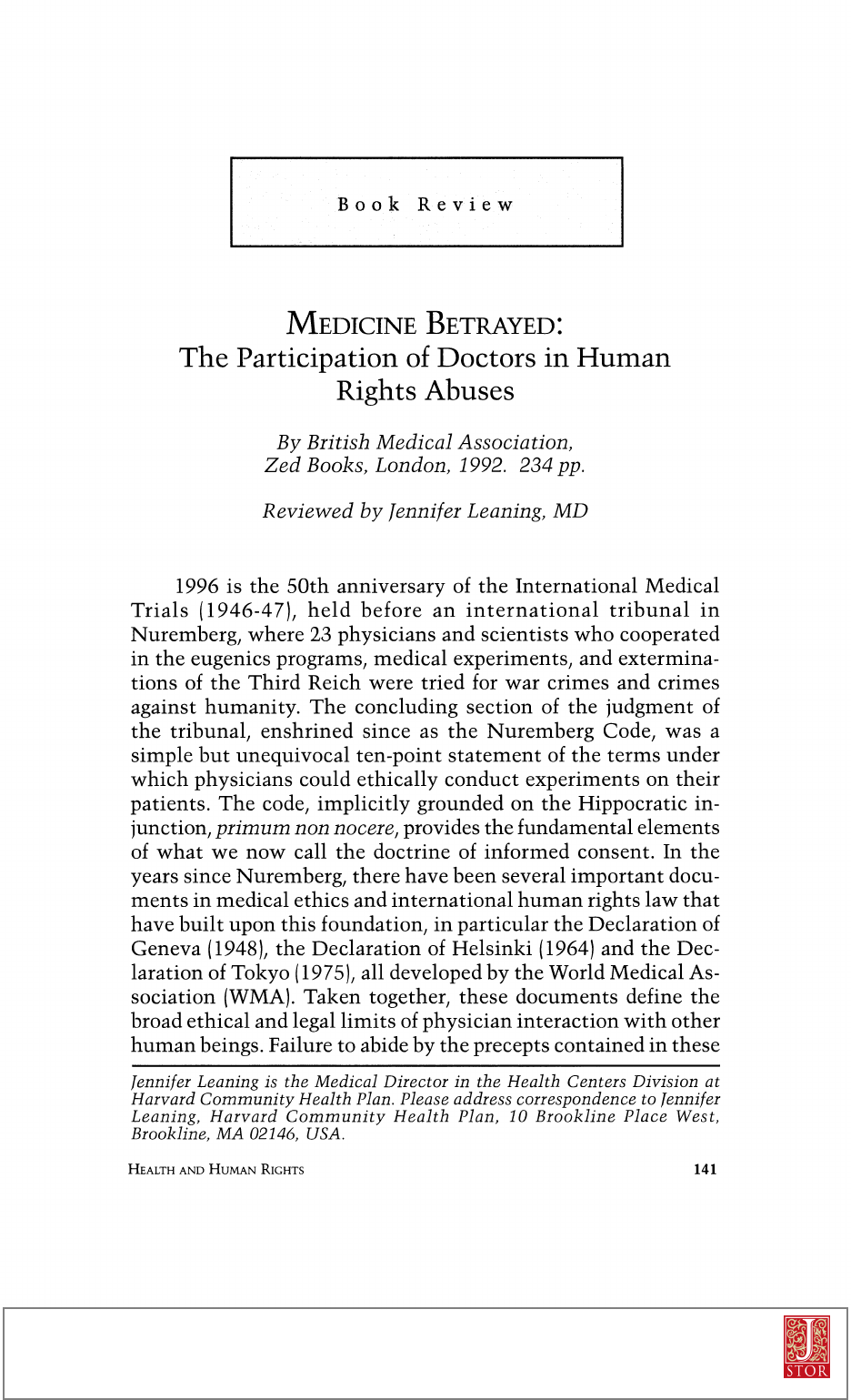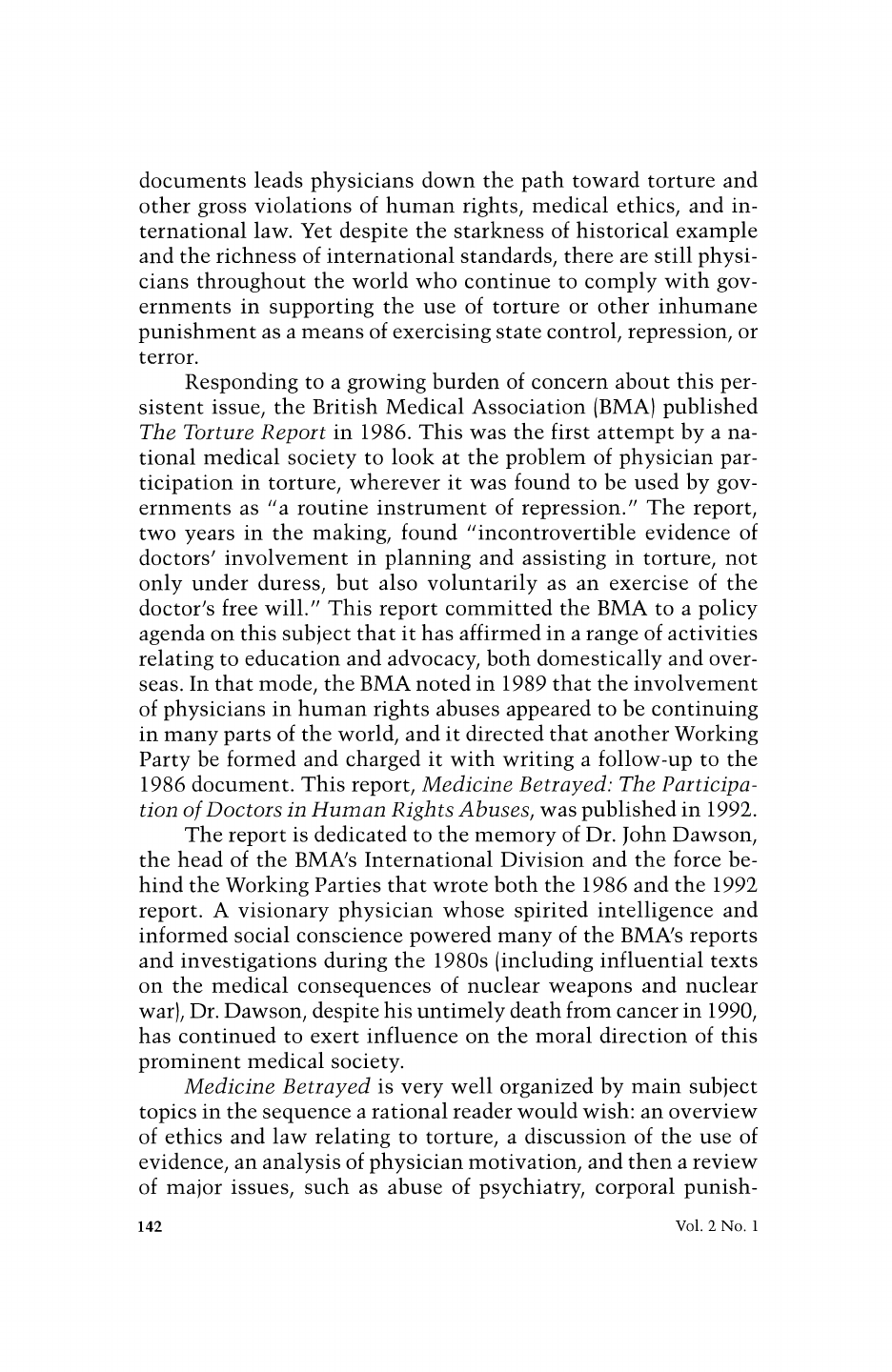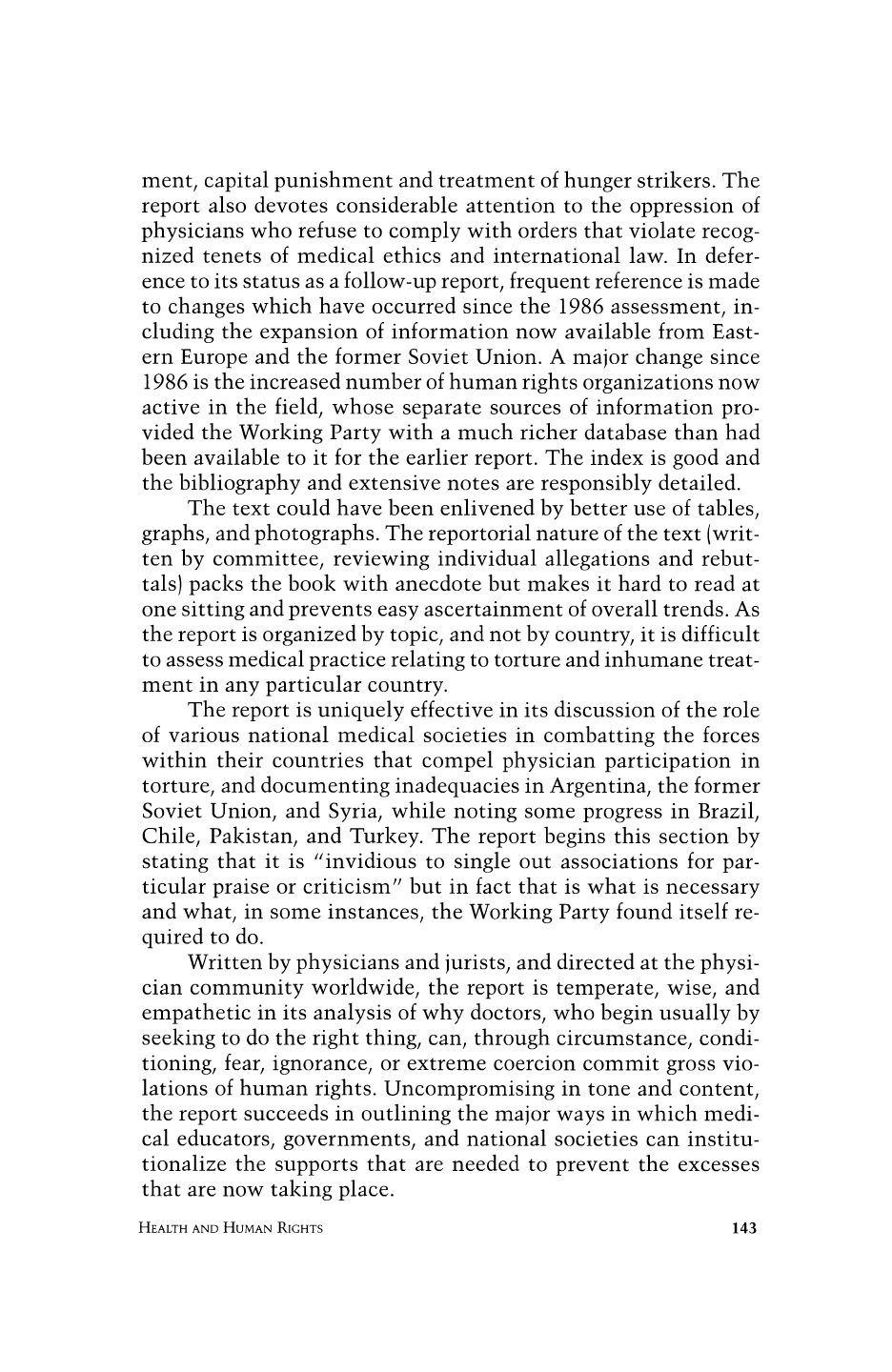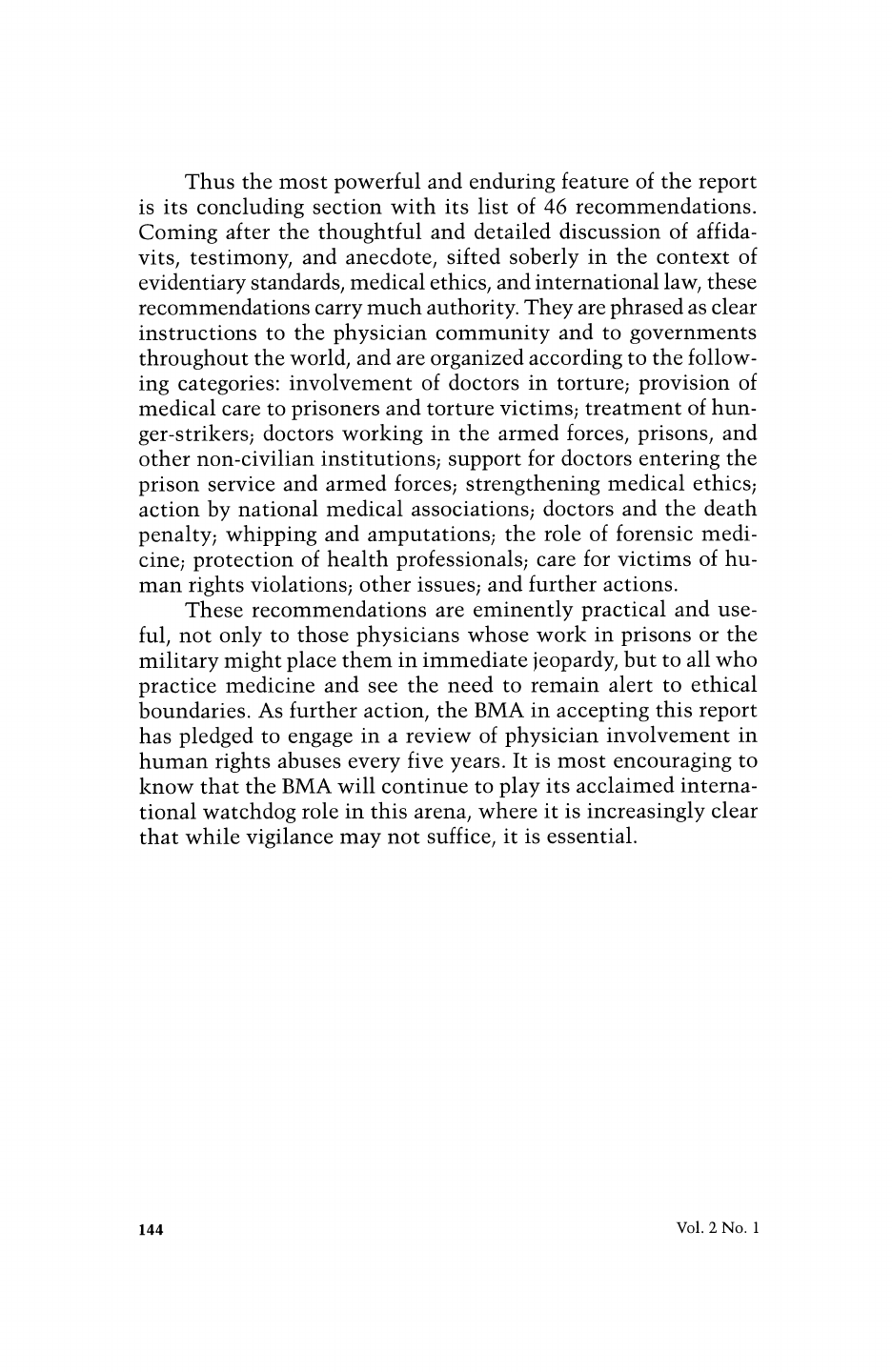
Book Revi
Iew
MEDICINE
BETRAYED:
The Participation
of
Doctors
in
Human
Rights
Abuses
By British Medical
Association,
Zed
Books, London,
1992.
234
pp.
Reviewed
by Jennifer
Leaning,
MD
1996 is the
5Oth anniversary
of the International
Medical
Trials
(1946-47),
held before an international
tribunal
in
Nuremberg,
where 23
physicians
and
scientists
who
cooperated
in
the eugenics programs,
medical experiments,
and extermina-
tions of the Third Reich were tried
for war crimes and crimes
against
humanity.
The
concluding
section of the
judgment
of
the tribunal, enshrined
since as the Nuremberg Code,
was a
simple
but
unequivocal
ten-point
statement of the
terms under
which
physicians
could
ethically
conduct
experiments
on
their
patients.
The
code, implicitly grounded
on the Hippocratic
in-
junction, primum
non
nocere, provides
the fundamental elements
of
what we
now call the doctrine of informed consent.
In the
years
since
Nuremberg,
there have been several
important
docu-
ments
in
medical ethics and international
human
rights
law
that
have built
upon
this foundation,
in
particular
the Declaration of
Geneva
(1948),
the Declaration
of Helsinki
(1964)
and the Dec-
laration of
Tokyo
(
1975),
all
developed
by
the World Medical
As-
sociation
(WMA).
Taken
together,
these documents
define the
broad ethical and
legal
limits of
physician
interaction with other
human
beings.
Failure to abide
by
the
precepts
contained
in
these
Jennifer Leaning
is the Medical Director
in
the
Health Centers Division at
Harvard
Community
Health Plan. Please address correspondence to
Jennifer
Leaning,
Harvard
Community
Health Plan, 10
Brookline Place
West,
Brookline,
MA
02146,
USA.
HEALTH AND HUMAN
RIGHTS
141
The President and Fellows of Harvard College
is collaborating with JSTOR to digitize, preserve, and extend access to
Health and Human Rights
www.jstor.org
®

documents leads physicians
down the path
toward torture and
other gross violations
of human rights, medical
ethics, and
in-
ternational law.
Yet
despite
the
starkness
of historical example
and the richness
of
international standards,
there are still physi-
cians throughout
the world who continue
to comply with gov-
ernments
in
supporting
the use of torture
or other inhumane
punishment as
a
means
of
exercising
state control, repression, or
terror.
Responding
to a
growing
burden of concern about this
per-
sistent
issue,
the British Medical Association
(BMA) published
The Torture Report
in
1986. This was the
first attempt by
a na-
tional
medical
society
to look at the
problem
of
physician par-
ticipation
in
torture,
wherever it was found to be used
by gov-
ernments as
"a routine instrument of
repression."
The
report,
two years
in
the making, found "incontrovertible
evidence of
doctors'
involvement
in
planning
and
assisting
in
torture,
not
only
under
duress,
but also
voluntarily
as an exercise of the
doctor's free will." This
report
committed
the
BMA
to a
policy
agenda
on this
subject
that
it
has affirmed
in a
range
of activities
relating
to education and
advocacy,
both domestically
and over-
seas.
In
that
mode,
the BMA noted
in
1989
that the involvement
of
physicians
in human
rights
abuses
appeared
to be
continuing
in
many parts of
the
world,
and it directed that another Working
Party be formed
and
charged
it
with
writing a follow-up to the
1986
document.
This
report,
Medicine
Betrayed:
The
Participa-
tion
of
Doctors
in
Human
Rights Abuses,
was
published
in
1992.
The
report
is dedicated to the
memory
of Dr.
John Dawson,
the head of the
BMA's
International
Division and the force be-
hind the
Working
Parties
that
wrote both
the
1986
and the
1992
report.
A
visionary
physician
whose
spirited
intelligence and
informed social
conscience
powered many
of the BMA's
reports
and
investigations
during
the
1980s (including
influential texts
on the
medical
consequences
of nuclear
weapons
and nuclear
war),
Dr.
Dawson,
despite
his
untimely
death from cancer
in
1990,
has continued
to exert influence on the moral direction
of
this
prominent
medical
society.
Medicine Betrayed
is
very well organized
by
main
subject
topics
in the
sequence
a rational reader would wish:
an overview
of ethics
and law
relating
to
torture,
a discussion of
the use of
evidence,
an
analysis
of
physician
motivation,
and
then a review
of
major issues,
such as abuse of
psychiatry,
corporal punish-
142
Vol.
2 No.
1

ment, capital punishment
and treatment of
hunger
strikers. The
report also
devotes considerable attention to the
oppression of
physicians
who refuse to
comply with orders that violate
recog-
nized tenets of
medical ethics and international
law.
In
defer-
ence to its status as a
follow-up report, frequent reference is made
to changes
which have occurred
since the
1986 assessment,
in-
cluding
the
expansion
of
information now available
from East-
ern
Europe
and
the
former Soviet
Union.
A
major change
since
1986
is the increased number of human
rights
organizations
now
active
in
the
field,
whose
separate
sources of information
pro-
vided
the
Working Party
with a
much richer database than had
been available
to it
for the earlier
report.
The index
is
good
and
the
bibliography
and extensive notes are
responsibly
detailed.
The text could have been
enlivened
by
better use of
tables,
graphs,
and
photographs.
The
reportorial
nature of the text
(writ-
ten
by
committee, reviewing
individual
allegations
and
rebut-
tals)
packs
the book with anecdote but
makes it hard to read at
one
sitting
and
prevents easy
ascertainment of overall trends. As
the
report
is
organized
by topic,
and not
by
country,
it
is difficult
to assess medical
practice relating
to torture and
inhumane treat-
ment
in
any particular
country.
The report is
uniquely
effective in its
discussion of the role
of various national medical
societies
in
combatting
the
forces
within
their countries that
compel physician
participation
in
torture,
and
documenting inadequacies
in
Argentina,
the former
Soviet
Union,
and
Syria,
while
noting
some
progress
in
Brazil,
Chile, Pakistan,
and
Turkey.
The
report
begins
this section
by
stating
that it is "invidious
to
single
out
associations
for
par-
ticular
praise
or criticism"
but
in
fact that is
what is
necessary
and
what,
in
some
instances,
the
Working
Party
found itself re-
quired
to do.
Written
by
physicians
and
jurists,
and
directed at the
physi-
cian
community worldwide,
the
report
is
temperate, wise,
and
empathetic
in
its
analysis
of
why doctors,
who
begin usually by
seeking
to do the
right thing, can, through
circumstance,
condi-
tioning, fear,
ignorance,
or extreme coercion
commit
gross
vio-
lations of
human
rights. Uncompromising
in
tone and
content,
the
report
succeeds
in
outlining
the
major
ways
in
which medi-
cal
educators,
governments,
and
national societies can institu-
tionalize the
supports
that
are needed to
prevent
the excesses
that
are now
taking place.
HEALTH AND HUMAN
RIGHTS
143

Thus the most powerful
and enduring
feature
of the
report
is its
concluding
section
with
its list of 46
recommendations.
Coming
after the
thoughtful
and detailed discussion
of affida-
vits,
testimony,
and
anecdote,
sifted
soberly
in the
context
of
evidentiary
standards,
medical
ethics,
and international
law,
these
recommendations
carry
much
authority.
They
are phrased
as clear
instructions
to the
physician
community
and to
governments
throughout
the world,
and are organized
according
to
the follow-
ing
categories:
involvement of
doctors
in
torture;
provision
of
medical
care to
prisoners
and torture
victims; treatment
of hun-
ger-strikers;
doctors working
in
the
armed
forces,
prisons,
and
other non-civilian
institutions; support
for doctors entering
the
prison
service
and
armed
forces;
strengthening
medical
ethics;
action
by
national medical associations;
doctors and
the
death
penalty;
whipping
and
amputations;
the role of forensic
medi-
cine; protection
of
health
professionals;
care for victims
of hu-
man rights
violations;
other
issues;
and
further actions.
These
recommendations
are
eminently practical
and use-
ful,
not
only
to
those
physicians
whose work
in
prisons
or
the
military
might place
them
in
immediate
jeopardy,
but to all
who
practice
medicine
and see
the need to remain
alert
to ethical
boundaries.
As
further
action,
the
BMA in
accepting
this
report
has
pledged
to
engage
in
a review
of
physician
involvement
in
human
rights
abuses
every
five
years.
It is most
encouraging
to
know
that the
BMA will continue
to
play
its acclaimed
interna-
tional watchdog
role
in
this
arena,
where
it is
increasingly
clear
that while
vigilance
may
not
suffice,
it is essential.
144
Vol.
2
No.
1
